
The Bee Gees were a musical group formed in 1958 by brothers Barry,Robin,and Maurice Gibb. The trio were especially successful in popular music in the late 1960s and early 1970s,and later as prominent performers in the disco music era in the mid- to late 1970s. The group sang recognisable three-part tight harmonies:Robin's clear vibrato lead vocals were a hallmark of their earlier hits,while Barry's R&B falsetto became their signature sound during the mid- to late 1970s and 1980s. The group wrote all their own original material,as well as writing and producing several major hits for other artists,and are regarded as one of the most important and influential acts in pop-music history. They have been referred to in the media as The Disco Kings,Britain's First Family of Harmony,and The Kings of Dance Music.

Sir Barry Alan Crompton Gibb is a British musician,singer,songwriter and record producer. He rose to worldwide fame as a member of the Bee Gees,with his younger brothers,Robin and Maurice Gibb,one of the most commercially successful groups in the history of popular music.

Cucumber Castle is the seventh studio album by the Bee Gees,released in April 1970. It was produced by Barry Gibb,Maurice Gibb,and Robert Stigwood. It consists of songs from their television special of the same name,which was named after a song on their 1967 album Bee Gees' 1st. Cucumber Castle is the only Bee Gees album not to feature any recorded contributions from Robin Gibb,as he had left the group before the album was recorded.

Best of Bee Gees is a 1969 compilation album by the English-Australian rock band Bee Gees. It was their first international greatest hits album. It featured their singles from 1966–1969 with the exception of the band's 1968 single "Jumbo".
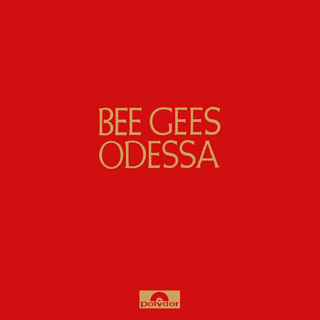
Odessa is the sixth studio album by the Bee Gees,a double vinyl LP released in February 1969,initially in an opulent red flocked cover with gold lettering. Despite reaching the UK Top Ten and the US Top 20,the album was not particularly well-received,though now is regarded by many as the most significant of the group's Sixties albums. An ambitious project,originally intended as a concept album on the loss of a fictional ship in 1899,it created tension and disagreements in the band regarding the work's direction;finally,a dispute over which song to release as a single led to Robin Gibb temporarily leaving the group.

Horizontal is the fourth studio album by the Bee Gees,and their second album to receive an international release. The LP was released in early 1968,and included the international hit singles "Massachusetts" and "World". On 5 February 2007,Reprise Records reissued Horizontal with both stereo and mono mixes on one disc and a bonus disc of unreleased songs,non-album tracks,and alternate takes. The album was released in Polydor in many countries and on Atco only in the US and Canada. "And the Sun Will Shine" was released as a single only in France. The influences displayed on the album range from the Beatles to baroque pop.
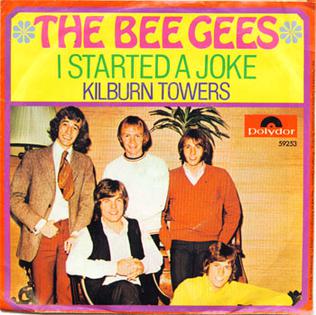
"I Started a Joke" is a song by the Bee Gees from their 1968 album Idea,which was released as a single in December of that year. It was not released as a single in the United Kingdom,where buyers who could not afford the album had to content themselves with a Polydor version by Heath Hampstead. This is the last Bee Gees single to feature Vince Melouney's guitar work,as he left the band in early December after this song was released as a single.
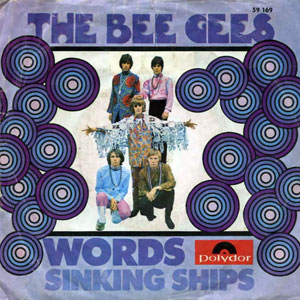
"Words" is a song by the Bee Gees,written by Barry,Robin and Maurice Gibb. The song reached No. 1 in Germany,Canada,Switzerland,and the Netherlands.
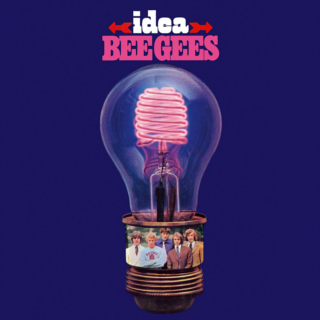
Idea is the fifth album by the Bee Gees. Released in September 1968,the album sold over a million copies worldwide. The album was issued in both mono and stereo pressings in the UK. The artwork on the Polydor release designed by Wolfgang Heilemann featured a "beehive" neon lightbulb with a group photo in its base,while the North American ATCO release designed by Klaus Voormann featured a composite head made from each band member. It was their third internationally released album –the first two albums being released only in the Australian market.
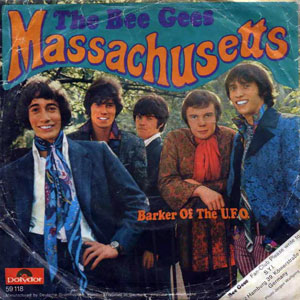
"(The Lights Went Out In) Massachusetts" is a song by the Bee Gees,written by Barry,Robin and Maurice Gibb and released in 1967. Robin Gibb sang lead vocals on this song and it would become one of his staple songs to perform during both Bee Gees concerts and his solo appearances. It later appeared on their 1968 album,Horizontal.
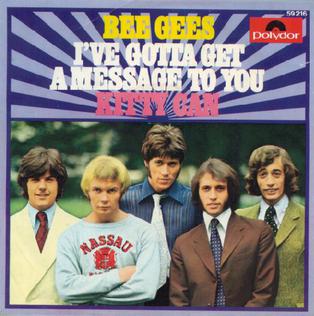
"I've Gotta Get a Message to You" is a song by the Bee Gees. Released as a single in 1968,it was their second number-one hit in the UK Singles Chart,and their first US Top 10 hit. Barry Gibb re-recorded the song with Keith Urban for his 2021 album Greenfields.
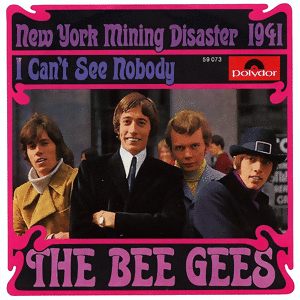
"New York Mining Disaster 1941" is the debut American single by the Bee Gees,released on 14 April 1967. It was written by Barry and Robin Gibb. Aside from a moderately successful reissue of their Australian single "Spicks and Specks," it was the first single release of the group's international career and their first song to hit the charts in both the UK and the US. It was produced by Ossie Byrne with their manager Robert Stigwood as executive producer. The song was the first track of side two on the group's international debut album,Bee Gees' 1st. This was the first single with Australian drummer Colin Petersen as an official member of the band.
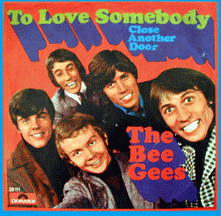
"To Love Somebody" is a song written by Barry and Robin Gibb. Produced by Robert Stigwood,it was the second single released by the Bee Gees from their international debut album,Bee Gees 1st,in 1967. The single reached No. 17 in the United States and No. 41 in the United Kingdom. The song's B-side was "Close Another Door". The single was reissued in 1980 on RSO Records with "How Can You Mend a Broken Heart" as its flipside. The song ranked at number 94 on NME magazine's "100 Best Tracks of the Sixties". It was a minor hit in the UK and France. It reached the top 20 in the US. It reached the top 10 in Canada.

"World" is a song by the Bee Gees,released in 1967 as a single in the United Kingdom and Europe and then included on their album Horizontal the following year. Though it was a big hit in Europe,Atco Records did not issue it as a single in the United States,having just issued a third single from Bee Gees' 1st,"Holiday".

"First of May" is a song by the Bee Gees with lead vocals by Barry Gibb,released as a single from their 1969 double album Odessa. Its B-side was "Lamplight". It also featured as the B-side of "Melody Fair" when that song was released as a single in the Far East in 1971 as well as in 1976 and 1980 on RSO Records. It was the first Bee Gees single to be released after lead guitarist Vince Melouney had left the group.
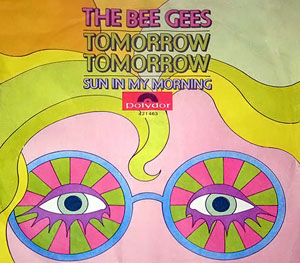
"Tomorrow Tomorrow" is a song by the Bee Gees written by Barry and Maurice Gibb. The song was originally intended to be recorded by Joe Cocker. It was the first Bee Gees single released after Robin Gibb had quit the group which was now down to a trio featuring Barry Gibb,Maurice Gibb,and drummer Colin Petersen.

"I.O.I.O." is a song by the Bee Gees,released on the album Cucumber Castle. It was written by Barry and Maurice Gibb. The song was released as a single in March 1970,and was also one of the highlights of the album. The single was a relative success mainly on European charts. Its music video is taken from the film Cucumber Castle.

Frederick Colin Petersen is an Australian drummer,record producer and former child actor. He played as a member of the bands Steve and the Board,the Bee Gees and Humpy Bong. In August 1969,he left the Bee Gees and he was replaced by Pentangle drummer Terry Cox to record the songs for their 1970 album Cucumber Castle. His scenes from the film of the same name were cut,and he is not credited on the accompanying album soundtrack,even though he does play on some songs.

Bee Gees' 1st is the third studio album by the Bee Gees,and their first international full-length recording after two albums distributed only in Australia and New Zealand. Bee Gees' 1st was the group's debut album for the UK Polydor label,and for the US Atco label. Bee Gees 1st was released on 14 July 1967 in the UK. On 9 August it entered the UK charts;on that same day,the album was released in the US,and it entered the US charts on 26 August.
"The Singer Sang His Song" is a song by the Bee Gees,written by Barry,Robin and released in early 1968 as a single along with Jumbo. In some countries the song was the B-side of Jumbo but in others they were promoted as a double A-side.


















